
REPRESENTATIONS
Scope & Guideline
Innovating Scholarship Across Diverse Fields
Introduction
Aims and Scopes
- Cultural Representation and Critique:
The journal emphasizes the examination of cultural texts and practices, interrogating how they represent social realities, ideologies, and power dynamics. This includes literary criticism, media studies, and visual culture. - Interdisciplinary Approaches:
REPRESENTATIONS promotes interdisciplinary methodologies, drawing from fields such as philosophy, sociology, anthropology, and art history to enrich analyses of representation and meaning. - Historical Contextualization:
Many papers delve into historical texts and practices, exploring how past ideologies and representations influence contemporary understanding and cultural discourse. - Focus on Marginalized Voices:
The journal prioritizes the representation of marginalized groups and perspectives, addressing issues of race, gender, sexuality, and colonialism, thereby contributing to broader discussions of social justice and equity. - Theoretical Innovation:
REPRESENTATIONS encourages innovative theoretical approaches, often revisiting and reinterpreting established theories to apply them to new contexts and contemporary issues.
Trending and Emerging
- Decolonial and Anticolonial Perspectives:
There is a significant increase in papers addressing themes of decolonization and anticolonialism, reflecting a growing academic interest in how historical legacies shape contemporary cultural and political landscapes. - Intersectionality and Queer Theory:
The journal has embraced intersectional approaches that consider the interplay of race, gender, and sexuality, with a marked rise in queer theory discussions that challenge normative frameworks. - Environmental and Anthropocene Studies:
Emerging themes related to the Anthropocene and environmental issues are gaining traction, indicating a shift towards exploring cultural representations of ecological crises and their implications. - Technological Mediation and Digital Culture:
Papers exploring the impact of technology and digital culture on representation are increasingly prevalent, reflecting contemporary concerns about media, identity, and communication. - Cognitive and Psychological Approaches:
The integration of cognitive science and psychological theories into the analysis of representation is an emerging trend, suggesting a multidisciplinary approach that seeks to understand how individuals perceive and interpret cultural texts.
Declining or Waning
- Traditional Literary Canon:
There appears to be a noticeable decrease in papers focused solely on traditional literary canon and classic texts, as the journal increasingly prioritizes contemporary issues and interdisciplinary approaches. - Formalism and Aestheticism:
Papers that engage primarily with formalist or aesthetic theories without tying them to broader sociopolitical contexts are becoming less frequent, indicating a shift towards more contextually grounded analyses. - Historical Literary Figures in Isolation:
The focus on historical literary figures without connection to modern implications or cross-disciplinary relevance has diminished, suggesting a preference for analyses that bridge past and present. - Narrowly Defined Gender Studies:
While gender studies remain a vital area, discussions that solely adhere to binary perspectives without considering intersectionality or contemporary gender theories are appearing less often. - Purely Theoretical Discussions:
There is a decline in the publication of papers that focus solely on abstract theoretical discussions without practical applications or cultural relevance, highlighting a move towards more grounded scholarship.
Similar Journals

LILI-ZEITSCHRIFT FUR LITERATURWISSENSCHAFT UND LINGUISTIK
Advancing Knowledge in Literary and Linguistic DisciplinesLILI-ZEITSCHRIFT FUR LITERATURWISSENSCHAFT UND LINGUISTIK is a prestigious academic journal published by J B METZLER in Germany, focusing on the diverse fields of Literature and Linguistics. With an ISSN of 0049-8653 and an E-ISSN of 2365-953X, this journal serves as a vital platform for scholars and practitioners to explore contemporary debates and theoretical advancements within these disciplines. It holds a noteworthy Impact Factor, reflecting its significance: categorized in Q3 for Linguistics and Language and Q1 for Literature and Literary Theory in 2023. Scopus rankings further affirm its role, situating it in the top 82nd percentile for Arts and Humanities, demonstrating its respected status among academic peers. Though it does not offer open access, its rigorous peer-review process ensures the publication of high-quality research from 2009 through 2024. With its commitment to advancing knowledge, LILI-ZEITSCHRIFT stands as a crucial resource for researchers, professionals, and students dedicated to the evolution of literary studies and linguistic inquiry.
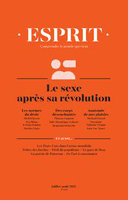
ESPRIT
Unveiling Insights from the Heart of ParisESPRIT is a well-established journal that has been contributing to the fields of Arts and Humanities, Political Science, and Sociology since its inception in 1973. Published in France and bearing the ISSN 0014-0759 and E-ISSN 2111-4579, ESPRIT provides a scholarly platform for research articles that delve into diverse cultural, political, and sociological themes, facilitating critical discourse among academics and practitioners. Although it currently operates under traditional access models, its relevance is underscored by its rankings in Scopus, including a Q4 classification across multiple categories, making it a key resource for those exploring nuanced academic landscapes. With an address located in the heart of Paris, ESPRIT draws from a rich cultural context that enhances its publication scope, poised to inspire and inform a global audience dedicated to the advancement of knowledge in the humanities and social sciences.
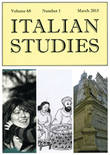
Italian Studies
Bridging Past and Present in Italian Literary DiscourseItalian Studies, published by Routledge Journals, Taylor & Francis Ltd, stands as a distinguished academic platform in the fields of Cultural Studies, History, Linguistics, Language, Literature, and the Visual Arts. Established in 1937, this journal has fostered scholarly dialogue and innovation through its robust contributions and in-depth analyses that bridge historical and contemporary perspectives on Italian culture. With an impressive ranking in Q2 and Q3 quartiles across multiple categories, including Literature and Literary Theory, and a current impact factor reflecting its growing influence, Italian Studies serves as an essential resource for researchers, professionals, and students alike. Although not an open-access journal, it remains accessible via institutional subscriptions, ensuring that a wide audience can engage with its critically acclaimed research and articles. Located in the UK, Italian Studies continues to advance the understanding of Italy's rich cultural heritage, making it a vital cornerstone for those invested in the humanities and social sciences.

RAMUS-CRITICAL STUDIES IN GREEK AND ROMAN LITERATURE
Bridging Ancient Wisdom with Contemporary InsightRAMUS: Critical Studies in Greek and Roman Literature, published by Cambridge University Press, stands as a premier journal dedicated to the exploration and analysis of classical literary texts. Established in 2002, this journal has garnered recognition in its field, achieving a Q1 category ranking in both Classics and Literature and Literary Theory for 2023, which reflects its commitment to scholarly excellence. With an impressive Scopus ranking, where it places in the 76th percentile for Literature and Literary Theory and the 70th percentile for Classics, RAMUS is a critical resource for researchers, professionals, and students engaged in the study of ancient texts and their lasting impact on contemporary literature. Although currently not an open-access journal, it offers a wealth of peer-reviewed articles, reviews, and critical essays that enrich understanding and foster discussions in the realms of Greek and Roman literary traditions. This journal not only serves as an academic platform but also contributes to the ongoing dialogue on the relevance of classical literature in today's cultural and literary discourse.
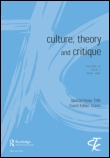
Culture Theory and Critique
Illuminating the Socio-Political Landscape of CultureCulture Theory and Critique, published by Routledge Journals, Taylor & Francis Ltd, is a pivotal journal that serves as a conduit for interdisciplinary research and discourse in the realms of Cultural Studies, Sociology, and Political Science. With an ISSN of 1473-5784 and E-ISSN 1473-5776, this journal has carved a niche for its innovative exploration of cultural phenomena and their socio-political implications. According to the latest metrics, it holds a notable position within the academic landscape, ranked Q2 in Cultural Studies and Q3 in Sociology and Political Science as of 2023. With a Scopus rank placing it in the 78th percentile for Cultural Studies, the journal not only contributes significantly to scholarly dialogue but also offers a critical platform for emerging theories and critiques from diverse perspectives. Although it operates under a standard access model, the journal encourages submissions that push the boundaries of current knowledge and engage with pressing cultural issues. Researchers, professionals, and students alike will find that Culture Theory and Critique is essential for fostering a deeper understanding of the dynamic interplay of culture and society, and it stands as a testament to the evolving landscape of cultural analysis.

Journal of Popular Television
Bridging Theory and Practice in TV StudiesJournal of Popular Television, published by INTELLECT LTD, is a pivotal platform dedicated to the exploration and analysis of television in popular culture, contributing significantly to the field of Communication. Based in the United Kingdom, this journal seeks to bridge theoretical frameworks with practical case studies, examining the impact of television as a social, political, and cultural force. With an ISSN of 2046-9861 and an E-ISSN of 2046-987X, it provides an open window for interdisciplinary research from 2019 to 2024. The journal holds a respectable rank within the Scopus database, positioned in the 28th percentile of its category, reflecting its growing influence and the quality of scholarship it fosters. As an essential resource for researchers, professionals, and students alike, the journal aims to deepen understanding of television's role in society, facilitating critical dialogue and engagement within the academic community.
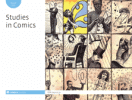
Studies in Comics
Fostering Dialogue Between Text and ImageStudies in Comics, published by INTELLECT LTD, is an esteemed journal situated at the intersection of Literature and Visual Arts, with a dedicated focus on the comic form. Operating since 2019, this journal has quickly established itself as a respected resource in both the Literary Theory and Visual Arts and Performing Arts categories, boasting a commendable Q2 ranking in 2023 within these fields. With an ISSN of 2040-3232 and an E-ISSN of 2040-3240, it provides a platform for rigorous scholarship that explores the multifaceted dimensions of comics, promoting interdisciplinary approaches that enrich understanding and foster dialogue among researchers, professionals, and students. With a notable position in the Scopus Ranks, being in the 84th percentile for Literature and 73rd for Visual Arts, the journal is committed to advancing the study of comics as a significant cultural artifact and artistic medium.
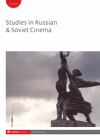
Studies in Russian and Soviet Cinema
Diving Deep into the Visual Arts of the Russian EraStudies in Russian and Soviet Cinema, published by Routledge Journals, Taylor & Francis Ltd, provides a critical forum for the exploration and analysis of cinematic practices, histories, and cultures from the Russian and Soviet eras. With its ISSN 1750-3132 and E-ISSN 1750-3140, this journal operates under the editorial guidance of leading scholars in the field, making significant contributions to the Visual Arts and Performing Arts and Communication categories, where it is ranked in the upper quartiles of its peer group. The journal spans a rich period of study, converging insights from 2006 to 2024, thereby allowing for an in-depth understanding of the evolution and impact of cinema in societal narratives. Researchers and enthusiasts alike will appreciate its dedication to illuminating the often-neglected cinematic treasures of Russia and the Soviet Union, promoting scholarly discourse through its rigorous analyses and diverse range of articles. This journal serves as an essential resource for anyone interested in the intersections of film, culture, and history.
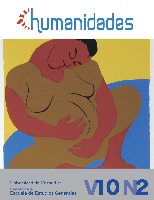
Revista Humanidades
Advancing Knowledge Through Cultural InsightsRevista Humanidades is an esteemed academic journal published by UNIV COSTA RICA, EDITORIAL, dedicated to advancing the field of Humanities. With an ISSN of 2215-2253 and an E-ISSN of 2215-3934, this open-access journal has been committed to disseminating high-quality research and scholarly discourse since 2011. Situated in the vibrant academic environment of Costa Rica, Revista Humanidades serves as a critical platform for interdisciplinary dialogue, fostering an understanding of cultural, philosophical, and social issues. Its commitment to open access ensures that valuable academic contributions reach a global audience, enhancing accessibility and collaboration among researchers, professionals, and students alike. Through its rigorous peer-review process, the journal maintains high academic standards, making it an essential resource in the Humanities sector for those seeking to explore fundamental questions of human experience and cultural engagement.
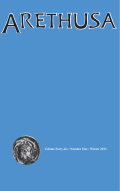
ARETHUSA
Cultivating Critical Analysis in the HumanitiesARETHUSA, published by the Johns Hopkins University Press, is a prestigious journal that aims to foster dialogue and scholarship in the fields of Classics, Cultural Studies, and Literature and Literary Theory. Since its inception, it has been recognized for its profound impact on academic research, reflected in its Q2 rankings across multiple categories. With an ISSN of 0004-0975 and an E-ISSN of 1080-6504, ARETHUSA embraces a comprehensive scope that encourages innovative discourse and critical analysis from 1974 through to 2024. Although the journal does not offer open access, its rigorous selection process ensures that only the highest quality research is published, making it a vital resource for scholars, professionals, and students dedicated to advancing knowledge in these interconnected disciplines. The journal's commitment to excellence is further demonstrated by its standing in various Scopus rankings, reinforcing its significance in the scholarly community.